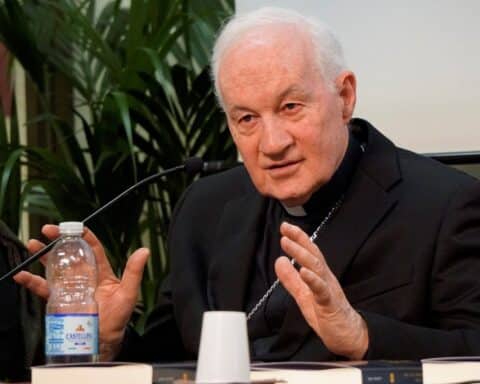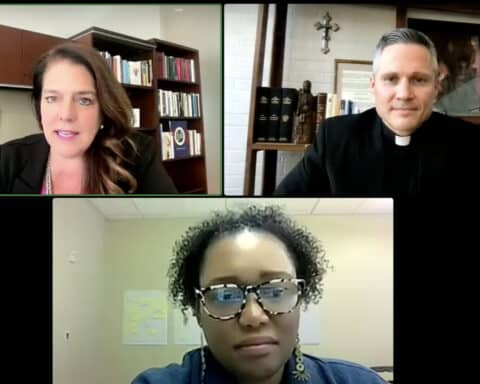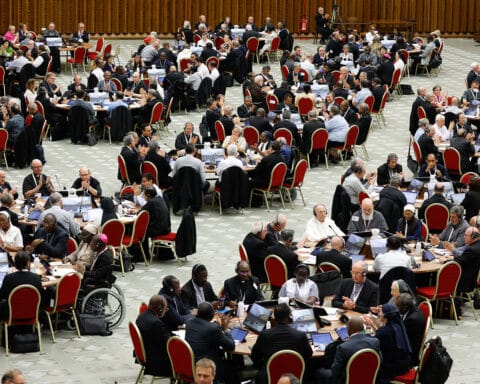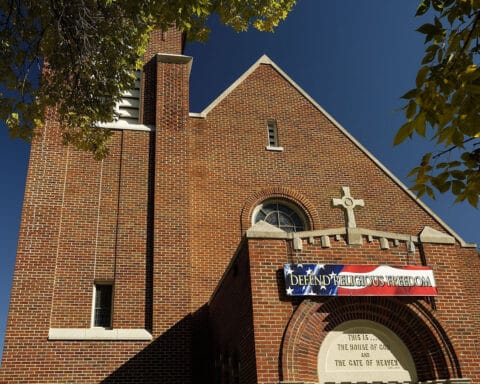On June 22, Catholics around the world will remember Sts. John Fisher and Thomas More, the bishop and chancellor executed by Henry VIII two weeks apart in 1535 for the crime of refusing to acknowledge the religious supremacy of the king of England.
In the United States, that day also marks the beginning of Religious Freedom Week, a time to reflect upon the challenges people of faith in the U.S. and around the world are facing regarding their right to freely exercise their religions, not only in their homes and houses of worship, but also in the public square.
“One of the things people don’t understand is that the freedom of religion is more than the freedom to worship,” said Barbara Samuells, president and co-founder of Catholics for Religious Freedom, a grassroots organization based in the Diocese of Rockville Center, New York. “It’s the freedom to speak out and bring your opinions and values into the public square.”
Samuells said she believes most Catholics in the United States are “blissfully ignorant” when it comes to threats to religious freedom.
“They say, ‘I can go to church on Sunday, so there’s no problem with my religious freedom,” she said. “The biggest challenge for everyday Catholics who understand about religious freedom and what needs to be done is getting people’s attention.”
Public witness of faith
This year, Catholics for Religious Freedom already has hosted a Concert for Religious Freedom, which is to be broadcast on the Catholic Faith Network on July 4. During the week itself, several parishes will hold prayer vigils and events emphasizing a public witness of faith, such as outdoor Rosary services, as well as panel discussions about religious freedom.
Many parishes in Minnesota also hold vespers or other prayer services for Religious Freedom Week, said Jason Adkins, executive director of the Minnesota Catholic Conference.
Fortnight for Freedom roots
The week has its roots in the Fortnight for Freedom, a two-week observance launched in 2012, when the U.S. Conference of Catholic Bishops and other Catholic institutions were working to get a portion of the Affordable Care Act overturned. That portion, known as the HHS mandate, required all employers that provide health insurance to cover contraception, sterilization procedures and other interventions that contradict Catholic teaching. While there was an exception for religious employers, it was very narrowly defined and did not include institutions such as Catholic universities and hospitals.
It was during that controversy — more or less resolved with a 2016 Supreme Court ruling in favor of the Little Sisters of the Poor, a religious community that operates nursing homes, and a 2018 change in the HHS rules — that the Fortnight for Freedom was born and the USCCB formed an ad hoc Committee for Religious Liberty.
| ‘Free to seek the truth’ |
|---|
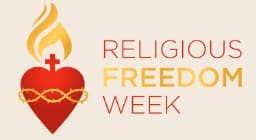 The U.S. Conference of Catholic Bishops says: “Religious freedom gives us the space to carry out the mission that Jesus has entrusted to the Church. Religious freedom means that Catholics, and all people of goodwill, are free to seek the truth and to live in accordance with that truth, and so to strengthen our common life as a nation. … In the midst of our current challenges, join us as we seek the kingdom and find Strength in Hope.” Learn more at www.usccb.org/ReligiousFreedomWeek. The U.S. Conference of Catholic Bishops says: “Religious freedom gives us the space to carry out the mission that Jesus has entrusted to the Church. Religious freedom means that Catholics, and all people of goodwill, are free to seek the truth and to live in accordance with that truth, and so to strengthen our common life as a nation. … In the midst of our current challenges, join us as we seek the kingdom and find Strength in Hope.” Learn more at www.usccb.org/ReligiousFreedomWeek. |
“The Fortnight for Freedom was so strongly associated with the HHS mandate that we wanted to do something to rebrand it,” said Aaron Matthew Weldon, program specialist for the U.S. Conference of Catholic Bishops’ office of religious liberty. “We wanted to raise other issues as well. We’ve shifted it to being more about prayer and awareness. With the Fortnight for Freedom, it tended to be observed with big rallies.”
The resources emphasize the “pray-reflect-act” model for action, he said.
He noted that the 2018 change from the Fortnight for Freedom to Religious Freedom Week also coincided with the USCCB’s decision to change its religious liberty committee from ad hoc to permanent status.
‘Strength in Hope’
The theme of this year’s Religious Freedom Week is “Strength in Hope,” and that’s more necessary than ever, said Adkins, a lay consultant to the USCCB’s religious liberty committee.
“When we started with the Fortnight for Freedom during the HHS mandate controversy, it was an uphill battle to build awareness,” he said. “Since then, I think we have built awareness, but the landscape feels more hostile. So we need to focus on strengthening hope.”
Domestically, the USCCB plans to use Religious Freedom Week this year to advocate for religious freedom in the areas of adoption and foster care. Several states already restrict adoption and foster care services to organizations that are willing to place children in homes with same-sex couples. That eliminates Catholic agencies from consideration.
“In Illinois, Massachusetts, California and in Washington, D.C., they’ve had to end those services simply for operating in a manner that is consistent with our Catholic values,” Weldon said.
Ramifications of Equality Act
Catholic religious-liberty advocates fear that even more Catholic agencies could be affected by the Equality Act, which passed the U.S. House of Representatives and was introduced in the U.S. Senate on May 20 and has been referred to the Committee on the Judiciary. It would “add the terms ‘sexual orientation’ and ‘gender identity’ to the definition of ‘sex’ in federal civil rights laws and have wide-reaching consequences for both employment and delivery of service standards in religiously affiliated schools, shelters, foster care and adoption agencies, potentially houses of worship, and other facilities and ministries,” according to a letter to Congress signed by the chairman of four USCCB committees, including Bishop Joseph Kurtz of Louisville, Kentucky, chairman of the religious liberty committee.
The committee also is focusing on questions that have been put to nominees for positions on the federal bench and in the executive branch, including, memorably, when Sen. Dianne Feinstein (D-California) said in 2017 to then-federal appeals court nominee Amy Coney Barrett, “The dogma lives loudly within you.”
Barrett went on to be confirmed and now serves on the federal Appeals Court of the 7th Circuit.
Still, comments and questions that cast doubt on a nominee’s ability to serve because of their Catholic faith amount to an unconstitutional religious test for nominees, Weldon said.
“It affects the younger generation of Catholics, who might say, ‘I don’t want to go into public service if I’m going to be scrutinized that way,'” he said.
Michelle Martin writes from Illinois.


